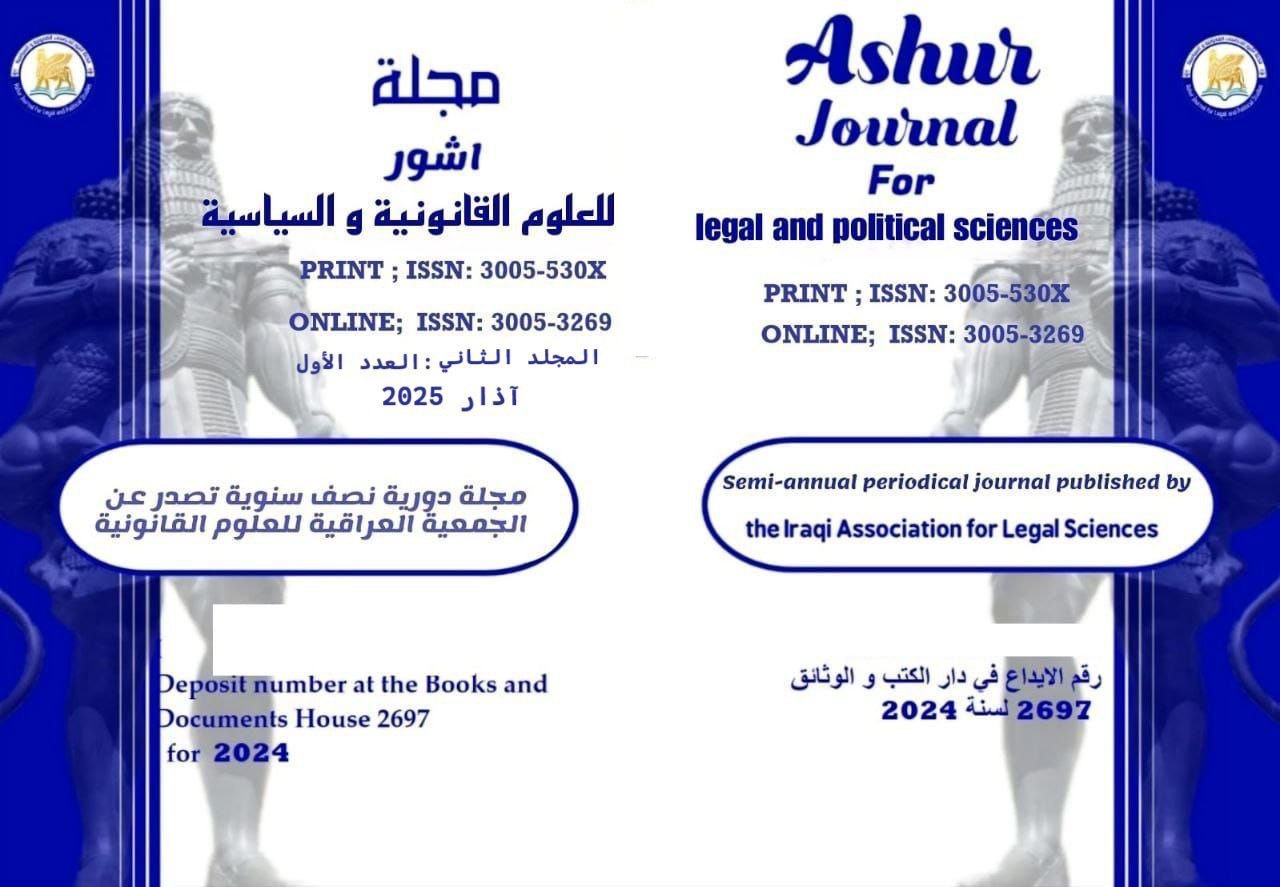The principle of equality and the feminist quota in the State of Iraq
DOI:
https://doi.org/10.64184/ajlps.V2.I1.Y2025.P124-176.18Abstract
This research aims to study the principle of gender equality and the application of the women's quota system in Iraq, as one of the important mechanisms to enhance women's political participation and empower them in the political, social, economic and cultural fields. The research is based on analyzing the Iraqi legislative and constitutional framework, focusing on the constitutional texts in the Iraqi Constitution of 2005, which emphasized the principle of equality and prohibited discrimination on the basis of gender. The research also addresses the women's quota system that was adopted in the Iraqi elections to ensure greater representation of women in the House of Representatives and local councils. The research reviews the challenges facing the application of the principle of equality and the women's quota system, including the political, social, economic and cultural factors that hinder women's effective participation in political life. In addition, the research highlights the achievements that have been made in this field, such as increasing the percentage of women's representation in the Iraqi parliament after the implementation of the quota system.
References
Sources and References
First/Linguistic Dictionaries:
1. Bin Manzur, Abu al-Fadl, (1990), Lisan al-Arab, Vol. 3, Beirut.
Secondly / Books:
1. Al-Hassan, Ihsan, (2009), Sociology of the Family, Dar Wael, Amman, Jordan.
2. Al-Haidari, Ibrahim, (01/07/2016), Patriarchal Hegemony in Society and Authority, Friday.
3. Al-Hafez, Hashim, (1980), History of Law, Dar al-Hurriyah for Printing, Baghdad.
4. Al-Khammash, Salwa, (1973), Arab Women and the Backward Traditional Society, Dar al-Haqiqa for Printing and Publishing, Beirut.
5. Al-Darini, Fathi, (1984), The Right and the Extent of the State's Authority to Restrict It, Al-Risala Foundation, Beirut, Third Edition.
6. Al-Ubaidi, Ahmed, (2013), Guarantees of the Principle of Equality in Some Arab Constitutions, Al-Halabi Legal Publications, First Edition.
7. Al-Ahani, Omar, (2011), Women's Political Rights in Islamic Jurisprudence, Modern University Office.
8. Al-Qassas, Mahdi, (2008), Family Sociology, Amer for Printing and Publishing, Mansoura.
9. Al-Lahham, Badi', (2001), Women's Work, Its Controls - Rulings - Fruits, Dar Al-Farabi, Damascus.
10. Al-Mufarji, Ihsan; Nima, Katran; Al-Jaddah, Raad, The General Theory of Constitutional Law and the Constitutional System in Iraq, Beirut - Lebanon, Al-Sanhouri Library.
11. Al-Yasiri, Yassin, (2011), Al-Wafi in Explaining the Iraqi Nationality Law, Al-Atik for Book Industry, Fourth Edition.
12. Baqir, Taha, (1955), Introduction to the History of Ancient Iraqi Civilizations, Part One, Baghdad.
13. Bensadoun, Nay, (2001), In Women's Rights from the Beginning to Our Days. Awidat for Publishing and Printing. Beirut.
14. Jassim, Farouk, (1987), The Legal Center for Women, Asaad Press, Baghdad.
15. Jassim, Raghad, (2012), "Partisan Political Participation of Iraqi Women after 2003", 1st ed., Dar Al-Kotob Al-Ilmiyyah, Baghdad.
16. Jaafar, Ashraf, (2009), Constitutional Organization of the Civil Service, Comparative Study, Dar Al Nahda Al Arabiya, Cairo.
17. Hamad, Nouriya, (2008), Study of Women's Empowerment and Ways to Support Their Participation in Development in the GCC Countries, Executive Office, Manama.
18. Zidane, Abdul Karim, (2000), Detailed Provisions on Women and the Muslim Home in Islamic Law, Al-Risala Foundation for Printing, Publishing and Distribution, Beirut, 3rd ed., vol. 4, no.
19. Abdul Aal, Okasha, (1996), Private International Law, Alexandria, Dar Al-Jami'a Al-Jadida, for Publishing.
20. Abdullah, Najib, (2000), Private International Law, Salabi Publishing Center.
21. Aoun, Randa, (2013), Discrimination against Women in Light of the Most Prominent International Conventions, Comparative Study, Printing, Publishing and Distribution, Zain Legal Library, Beirut - Lebanon.
22. Fahmy, Mohamed, (2012), Women's Participation in Third World Societies, Modern University Office.
23. Qawuqji, Wahbi, (1975), Muslim Women, Dar Al-Qalam, Damascus.
24. Qutb, Sayyid, (1962), Islam, Problems of Civilization, Dar Ihya Al-Kutub Al-Arabiya.
25. Qandil, Amani, The Arab Encyclopedia of Civil Society, The Egyptian General Book Authority, Cairo.
26. Kira, Hassan, (no year of publication), Principles of Law, Dar Al-Nahda Al-Arabiya, Beirut.
27. Hisham Ali Sadiq, (1982), History of Legal and Social Systems, Dar Al-Jami'iyya, Beirut.
Thirdly / Research and Working Papers:
1. Al-Husseini, Hamdiya, (3/4/2011), Political Rights of Iraqi Women (2003-2010), a working paper presented to the First Scientific Conference on Elections, Erbil.
2. Al-Qaisi Suhad, Diagnosing the Reality of Women's Entrepreneurial Patterns at Al-Mustansiriya University and Their Relationship to Some Personal Characteristics, An Exploratory Field Research on Women's Issues after 2003 in Light of Transformations and Challenges, Al-Mustansiriya Center for Arab and International Studies.
3. Al-Mahdawi, Wafaa; Hassan, Zahraa, (2013), Economic Empowerment of Women in Iraq, Iraqi Journal of Economic Sciences, Issue Thirty-Eight.
4. Hassoun, Tamadhar, (1993), The Impact of Women's Work on Family Cohesion in Arab Society, Arab Center for Security Studies and Training, Riyadh.
5. Hussein, Ghosoun, (2015), "The Role of Iraqi Women in Political Life for the Period 1958-1968" in Iraqi Women's Issues after 2003 in Light of Transformations and Challenges, Al-Mustansiriya Center for Arab and International Studies, Baghdad.
6. A Study Prepared by the Iraqi Organization for Human Rights Coordination for the Year 2006.
7. Zidane, Hussein, Aspects of Academic Freedoms.. Its Practice and Degree in Iraqi Universities, An Applied Study" issued by Al-Bayan Center for Studies and Planning.
8. Shafi, Karima, (2003), Women's Contribution to Economic Development after 2003, Women's Issues after 2003 in Light of Transformations and Challenges. Al-Mustansiriya Center for Arab and International Studies.
9. Sharaf Al-Din, Fahmiyya, (2002), Arab Women's Political Participation, Importance and Role (Issues Bulletin), Issue Two.
10. Faeq, Taghreed, Causes of Violence Against Women, Field Research. Ministry of Labor and Social Affairs, National Center for Research and Studies, Studies Department.
11. Miliani, Abdul Karim, (2021), Mother's Work and Its Impact on Children's Behavioral Discipline in the Learning Environment, Al-Risala Journal of Human Studies and Research, Volume 6, Issue 4.
12. Hani, Zahir Mohsen, (2017), "Women and Development: Between Challenge and Contribution: A Social Field Study For female employees of the University of Babylon, the issue of the Journal of the College of Basic Education for Educational and Human Sciences, University of Babylon.
Fourthly/ / University theses and dissertations:
1. Jamil, Tamam; Al-Darghma, Omar, (2014), The effectiveness of training provided by women's institutions in economically empowering Palestinian women from the perspective of the beneficiaries themselves, unpublished master's thesis, College of Graduate Studies, An-Najah National University.
2. Muhammad, Kawthar, (2012), Women's participation in political life in Iraq between 2003-2010, unpublished master's thesis, Islamic University - Faculty of Law, Khaldeh - Lebanon.
Fourthly/ Legislation:
Firstly/ Constitutions:
1. The Iraqi Constitution in force for the year 2005
Secondly/ Laws:
1. Personal Status Law, Iraqi Gazette, Issue 280, on 12/30/1959.
2. Statistics Law, Iraqi Gazette, Issue 736 on 11/04/1962.
3. Law ratifying the Convention on the Elimination of All Forms of Discrimination against Women No. (66) of 1986.
4. Labor Law No. (71) of 1987 amended by Law No. (37) of 2015 Labor Law, Iraqi Gazette, Issue 4386 on 11/09/2015.
5. Election Law No. (16) of 2005, Iraqi Gazette, Issue 4010, on 11/23/2005.
6. Iraqi Nationality Law No. 26 of 2006, Iraqi Gazette, Issue 4019 on 03/07/2006.
7. Law amending the Election Law No. (16) of 2005, Iraqi Gazette, Issue: 4140, on 28/12/2009.
8. Instructions for legal and accounting procedures for the Directorates of Minors’ Care No. (1) of 2011, Iraqi Gazette 4181, on 3/22/2011.
9. Law No. 27 of 2012, Iraq’s accession to the Arab Charter on Human Rights issued by the League of Arab States in 2004, Iraqi Gazette No. 4249 on 9/3/2012.
Fifth / Websites:
1. National Strategy for the Development of Women's Conditions in the Kurdistan Region 2016-2026, Supreme Council for Women's Affairs 2017, Shahab Press - Erbil 3. National Strategy for the Development of Women's Conditions in the Kurdistan Region 2016-2026 .pdf (b-cdn.net)
2. Al-Radady, Rania, Women's Economic Empowerment and Its Relationship to Family Security, Al-Watan Newspaper, 3/23/2021, https://www.alwatan.com.sa/article/117188
3 Jad, Sameh, (1974), Using the Right as a Reason for Criminal Permissibility. https://aljadeedmagazine.com
4 OIC Report on Women and Development, 2021
5 United Nations Population Fund Iraq (UNFPA), Analytical Report of the National Survey of Youth and Adolescence, Baghdad, 2011
6 United Nations Population Fund and the Women's Empowerment Department in Iraq, National Strategy to Combat Gender-Based Violence 2018-2030.
7 Abdul Salam Yahya Al-Mahtouri, Quota and its Applications in Electoral Systems, Quota and its Applications in... - Empowering Women in Leadership Positions | Facebook
8 Majeed, Susan, Preparing a strategy to empower female university leaders to advance higher education institutions and Iraqi state administrations, a step towards reform and development, Al-Hewar Al-Mutamadin, Issue 6927, Publication date 6/13/2021, Access date 9/12/2024, Susan Shaker Majeed - Preparing a strategy to empower female university leaders to advance higher education institutions and Iraqi state administrations, a step towards reform and development
9 https://www.alwatan.com.sa/article/117188
seventh / Foreign references:
1. Agnieszka Violetta Filipck, Family as a fundamental social unit shaping security culture: Polish realities, Siedle University of Natural Sciences and Humanities, Poland, Konarskiego 2, 08-110 Siedlce, Poland.
2. Iraq in 1325 UNSCR of Implementation: Masterplan, Taskforce Sector Cross (Government Regional Kurdistan and Iraq of Government Federal).
Downloads
Published
Issue
Section
License
The authors retain Full copyright of their published article
Ashur Journal of Legal and Political Sciences applies the Creative Commons Attribution 4.0 International (CC BY 4.0) License to articles and other works we publish. If you submit your paper for publication by AJLPS, you agree to have the CC BY 4.0 license applied to your work.
Articles can be read and shared for under the following conditions:
BY: Attribution must be given to the original source (Attribution)
Full details available at
https://creativecommons.org/licenses/by/4.0/






